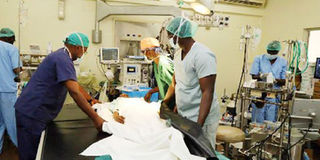40 patients to benefit from subsidised heart surgeries

A team of doctors from Kenyatta National Hospital (KNH) and Coast General Hospital prep a patient for open-heart surgery at Coast General Hospital on July 21, 2015. More than 40 patients will benefit from subsidised heart surgery, an initiative between KNH and a team of doctors from Germany. PHOTO | KEVIN ODIT | NATION MEDIA GROUP
What you need to know:
- The visiting team alongside doctors from KNH will offer pacemaker surgeries to treat patients who suffer from heart block, a condition that affects the heart’s electrical system that controls the rate and rhythm of heartbeats, at lower costs.
- He says the annual surgeries have since installed over 180 pacemakers and helped to review and change batteries of patients with the device.
Nearly 40 patients will benefit from subsidised heart surgery, courtesy of the Kenyatta National Hospital (KNH) and a team of doctors from Germany.
The visiting team, alongside doctors from KNH, will offer pacemaker surgeries to treat at a lower cost patients who suffer from heart block, a condition that affects the heart’s electrical system, which controls the rate and rhythm of heartbeats.
Consequently, the patients, all of whom suffer from a weak or irregular heartbeat, will have a pacemaker inserted just above their hearts to correct the anomaly.
A pacemaker is a medical device that helps to control abnormal heart rhythms.
It uses small amounts of electrical pulses to prompt the heart to beat at a normal rate.
Dr Bernard Gitura, a cardiologist at KNH, said a pacemaker costs between Sh270,000 and Sh300,000.
“However, the visiting team is donating the devices. Patients are only expected to cover the cost of using the facilities at KNH by only paying Sh20,000,” said Dr Gitura.
Dr Carsten Walter Israel, the chief cardiologist for the East African Heart Rhythm Project, told the Nation on Wednesday that though heart ailments are common, they are often not treated until it is too late.
He said: “When the heart does not pump enough blood to the body, it can cause symptoms such as fatigue, shortness of breath or fainting. Unfortunately this can be misdiagnosed and by the time one seeks treatment, severe damage to organs has already been done.”
“Thus, the primary purpose of a pacemaker is to maintain an adequate heart rate, either because the heart’s natural pacemaker is not fast enough or there is a block in the heart’s electrical conduction system.”
He said over 180 pacemakers had been installed in the annual surgeries, and doctors had reviewed and changed the batteries of devices in other patients who already have them.
The 10-day project will see the patients given pacemakers whose batteries would not need to be replaced for 10 to 15 years.




